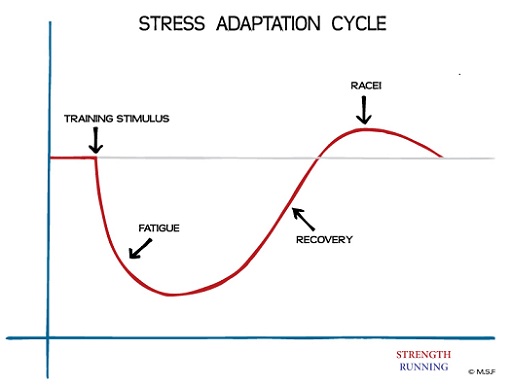Isn’t it funny that when something isn’t working, most of us just “buckle down” and try harder (even if you’re lost doing the wrong thing)?
Do you feel like your running is stuck in a maze and you’re not sure how to escape?
But often “what got you here, won’t get you there.” So if you’ve hit a plateau and are stagnating, running slow consistently and getting frustrated, doing more of the same isn’t the best approach.
Instead, stepping back and taking a big-picture look at your running can give you a clear picture of what needs an upgrade. Most of the time, I can look at a runner’s training and instantly spot 3-5+ areas of improvement that would dramatically help their race times or injury problems.
Let’s take a look at the big picture and identify the most common reasons that runners aren’t getting faster in their training.
Common Reasons Why You are Running Slow
To summarize, there are usually one or more of these issues present if your performances have plateaued:
- Not getting enough quality sleep.
- Experiencing too much stress.
- Not eating enough calories.
- Low iron levels.
- Weather considerations.
- Eating insufficient amounts of carbohydrates.
- Not running long runs.
- Not enough pace variety.
- Low overall mileage.
Do these sound familiar to you? Don’t worry, we’ll go through each one and provide ways to help you avoid these mistakes and prevent you from running slow.
Why We’re Running Slow
Recently, I got this note:
So, my big question is “have I ever run a step in my life??”
I’m almost embarrassed about my dismal results from Sunday’s race. I didn’t even look at my “official” time, it was that bad. I thought it started out pretty good but I just did not have any energy. It was just an incredibly sucky performance.
Anyway, I’ve been reviewing my stats from the last several weeks and am seeing a lot of this crappy work. It’s like I have no juice in my legs.
Does this sound familiar?
Have you ever been running just fine and then all of a sudden you have no juice in your legs? Like you can run 9:45 miles just fine but if you try for 9:30 it’s like the energy was drained from your body at the starting line? That, out of nowhere, all you can do is run slow?
Most runners inevitably hit a plateau or feel like they’re working hard but going nowhere. The culprit is usually a combination of lifestyle, weather, and training issues.
Your Lifestyle Is Slowing You Down

This is the most overlooked problem that runners experience because we tend to think if we’re training well, we should be racing well. But that’s simply not the case when a variety of lifestyle issues can make us feel like ten pounds of shit in a five pound bag on every run (possibly my favorite quote of all-time).
SLEEP!
Are you sleeping enough? Most of us aren’t and the value of sleep can’t be overlooked. You don’t get faster when you’re cranking out a long run or during a track workout. No, you get faster when you recover from and adapt to that stress – a process that takes a lot of sleep.
This is how the Stress – Adaptation Principle looks in action:
 See how your fitness dips after a “training stimulus” (or in other words, a tough workout)? If you don’t recover by sleeping a lot, you’ll never super-compensate and get in better shape.
See how your fitness dips after a “training stimulus” (or in other words, a tough workout)? If you don’t recover by sleeping a lot, you’ll never super-compensate and get in better shape.
The recommended amount of sleep for adults is 7 or more hours, but the amount you need can be variable. Ensure that you’re getting enough quality sleep by assessing your energy levels, mood, and food cravings the following day.
How stressed are you?
Your body can only deal with so much stress – both physical and mental. If you’re training for a 20-mile charity walk while trying to start a new business, now is not the time to pile 5k training on top of your other stressors!
There won’t be a chance for your body to adapt to your workouts if there’s too much other stress in your life. Make sure to remove outside stress whenever possible during periods of training and racing so that you’re giving yourself every chance to perform well.
Your diet might be terrible.
Lately I’ve written more about nutrition and weight loss on Strength Running because I think it’s critical for achieving your running potential. There are typically four culprits when it comes to poor performance related to diet and why you may be running slow:
- You’re not eating enough. I’ll use a great quote from Mark Sisson here: “Sometimes over-training is just under-eating.”
- You have low iron levels or are borderline anemic. This is more common in women and rare overall for most runners, but it’s something to be aware of if you’re feeling particularly sluggish.
- You’re chronically dehydrated. This likely isn’t a problem for most runners, but monitor the color of your urine. The lighter the better!
- You need to eat more carbohydrate. It’s the body’s preferred fuel source for high intensity activity so don’t be fooled into thinking you can diet or cut carbs while running a lot – you can’t.
Running Slow Due to Weather

During my first visit to Washington, DC I attempted a tempo workout in 90 degree heat with virtually 100% humidity (I could see the water vapor in the air).
After 5 minutes of hard running, my chest felt like it was being compressed by an invisible vise. I was soaked from head to toe with either sweat or dew – I couldn’t be sure – and I kept thinking the paved path I was on had magically turned into soft sand.
After another minute, I quit. I had never before experienced such brutal conditions and stopped a workout so suddenly.
Combine running in the heat with humidity and strong sun exposure and you have a recipe for misery and suffering. There’s no way around it: you will simply be running slow in summer conditions. And when they’re severe enough, they’re more challenging than being at 7,000 – 8,000 feet elevation!
But running in the winter has its perils as well: ice, snow, slick surfaces, and sub-zero temperatures can all conspire against you. While it’s not as difficult as summer training, running through Arctic conditions isn’t ideal.
No matter what the weather throws at you, it always helps to run by feel and worry about time and focus on effort, rather than distance and pace.
Is Your Training “Smart?”

If poor lifestyle habits are the most overlooked reason why you’re not improving as much as you’d like, poor training habits are the most common and important reason why you’re not getting faster or staying healthy.
Check out the Q&A video where I explain the three elements of smart training for injury prevention.
But in terms of improvement rates, there are three more critical pieces to getting faster that many runners are ignoring.
Not running long.
Are you running a long run every week? Is it “long” compared to the distance of your goal race?
There’s a reason that many runners affectionately call their weekend routine the “Church of the Sunday Long Run” – it’s the most important run of the week (especially for beginners). Running long builds endurance, helps make faster paces more sustainable, and gradually improves your ability to recover.
After a few weeks of skipped or missed long runs, your fitness declines and faster speeds seem more difficult. You’re simply not building the endurance base you need to support your other workouts.
A “normal” run of 5 miles may now be a lot closer to your long run – and it will feel that way! So do yourself a favor and prioritize the long run. It makes a huge difference and gets you over the hurdle of running slow.
No pace variety.
Runners also tend to do most of their training at the same pace. If you don’t ever run fast, you won’t ever run fast. You can click here to tweet that if you think it’s profound 🙂
But after you’re done tweeting, think hard about that: without varying your speed, you’ll inevitably fall into a rut and have only one gear (most likely, SLOW!). There’s three great ways to introduce more speeds into your running:
- Do a faster workout 1-2 times per week, like a simple fartlek workout
- Run your easy runs SLOW and your distance and long runs moderate (but still comfortable)
- Run strides a few times per week
By fixing this one pacing mistake you’ll feel a lot better on your runs and get a helluva lot faster.
Low volume.
Another reason why you are running slow may be low overall mileage. The more you run, the faster you’ll get. Applying that simple truth is what turns many average runners into significantly more competitive runners.
An enormous part of my job is getting runners to run more safely and without injuries. In fact, my little secret is that Injury Prevention for Runners is so much more than a “prevent injuries” program – it’s a “get faster” program designed to help you do it without getting hurt.
And I do that by helping runners run more. Instead of being scared of mileage increases or running more days per week, runners can rest easy knowing that the structure of their training is strategically designed to drastically cut their injury risk.
Now of course many beginners or injury-prone runners are reluctant to increase their mileage. But we can do more than we think: our capabilities are more impressive and our limitations are not that constraining. As long as you’re training smart, you can probably run a LOT more.
What Keeps You Running Slow?
These are the most common trends I’ve seen after studying the training of thousands of runners. Looking at my own 22 years of running experience, the races where I’ve failed to perform well are usually set in a training period where I’ve made these mistakes.
You’ve probably made some of the same mistakes along your running journey.
To help you improve, I’ve put together a free course that goes into more detail about these topics: injury prevention, strength exercises, mistakes to avoid, and more.
Sign up here and I’ll send the lessons straight to your inbox.
Run strong!